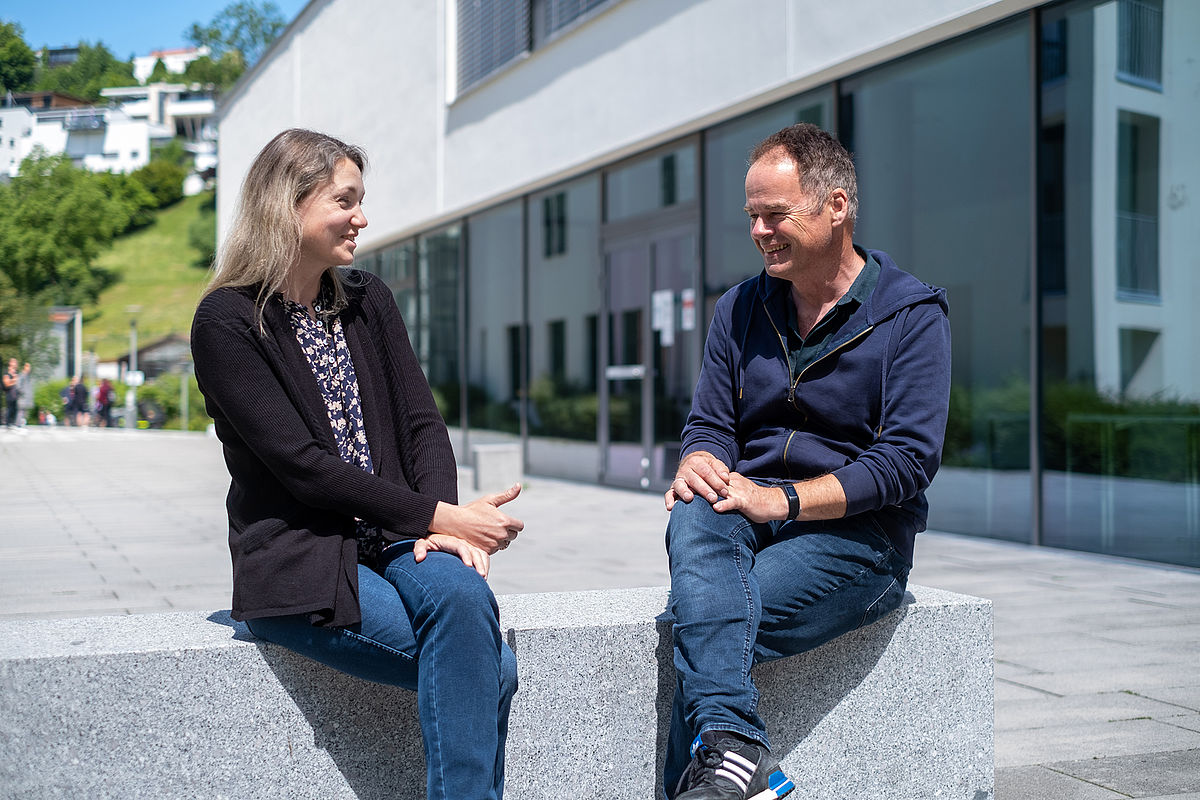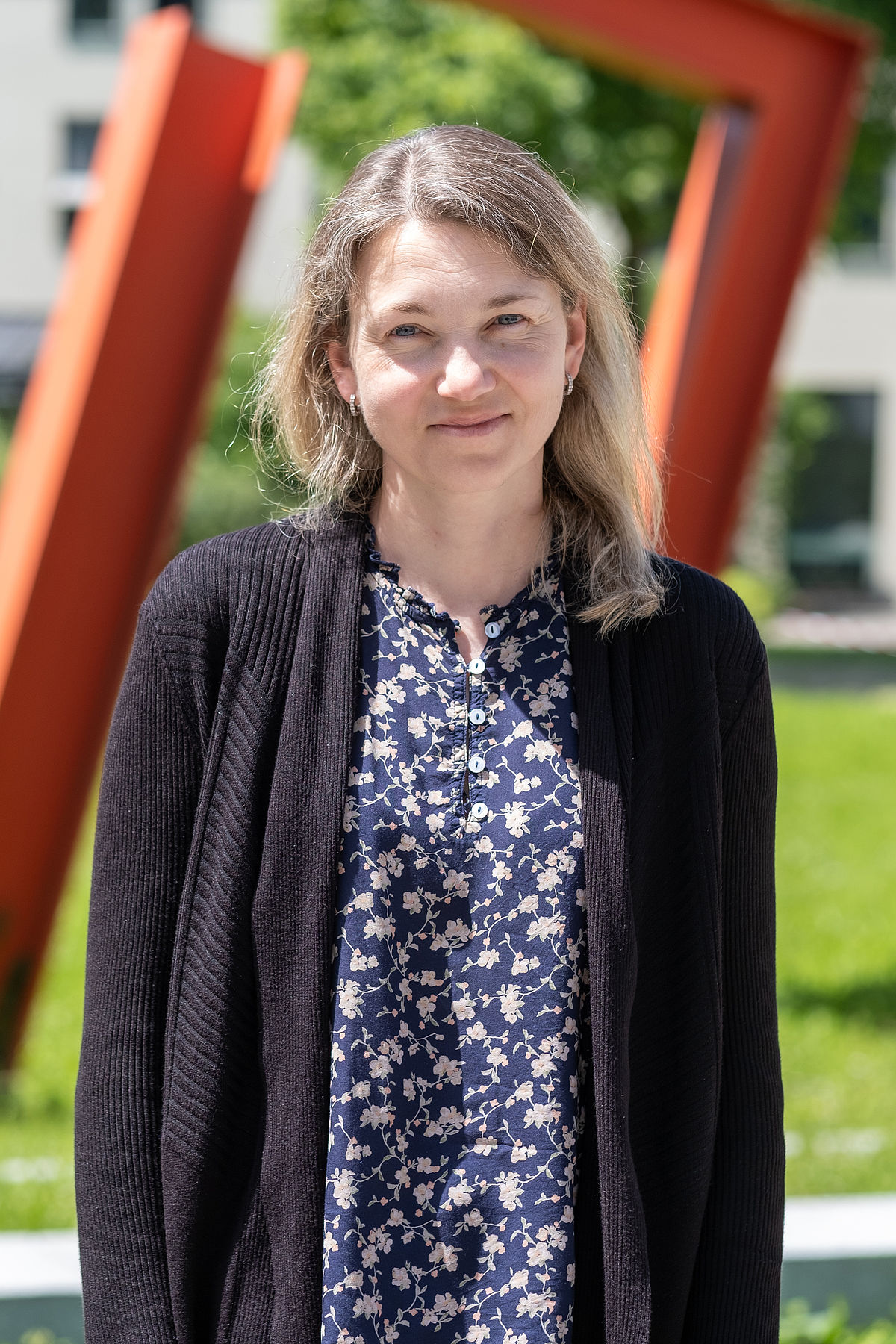Doing research while war is raging at home
Six Ukrainian researchers have been given the opportunity to continue their work at the University of Passau thanks to a scholarship awarded by the Volkswagen Foundation. The war in Ukraine is also very much a part of their research – both in direct and in indirect ways. We would like to present the researchers and their projects to you and tell you how the researchers found their way to Passau. The first profile is that of communication scholar Dr. Hanna Sarmina who will be studying digital journalism in Germany and Ukraine under the supervision of Professor Ralf Hohlfeld.
Dr. Hanna Sarmina - digital journalism in Germany and Ukraine
Dr. Hanna Sarmina has returned to familiar surroundings. The native Ukrainian knows Passau from previous joint projects with communication scholar Professor Ralf Hohlfeld. He was also the one to collect Dr. Sarmina and her daughter from the Hungarian-Ukrainian border at the beginning of March.
The Ukrainian scholar who had previously been conducting research and teaching at the Taras Shevchenko National University of Kyiv now has her office at the Centre for Media and Communication at the University of Passau. The shelves in the room are still empty, but that is likely to change in the next few months.
The researcher intends to continue her habilitation thesis, a comparative analysis contrasting digital journalism in Germany and Ukraine, with the help of the scholarship awarded by the Volkswagen Foundation. The idea and concept were developed in Passau and are based on insights gained in the EU-financed TEMPUS IV Project "Cross media and Quality Journalism". During the project, Dr. Sarmina visited Passau for the first time in 2016. One thing the research team realised: "Digital journalism" is a topic that has barely been explored in Ukrainian communication studies.
Dr. Sarmina intends to change this and conduct the first theory-driven study that examines the economic, social and political conditions in which digital journalism in Ukraine has developed over the past two decades. "In Ukraine, print journalism is unattractive. This is also because the postal service is not very reliably when it comes to delivering newspapers. As a result, the word daily quickly loses its meaning," she explains. "Online media, in contrast, are becoming ever more popular." Professor Hohlfeld who supervises Dr. Sarmina's habilitation thesis at the University of Passau adds: "That's exactly what makes it so exciting. While we still have a strong print media industry in Germany, Ukraine is simply skipping that stage. How will digital journalism evolve under these conditions?"
There is another topic that connects Dr. Sarmina with Professor Hohlfeld's research priorities: the handling of disinformation, fake news and propaganda. These are some of the aspect she will be devoting particular attention to in her analysis. Ukraine offers lots of research material in this respect too. According to Dr. Sarmina, Russian propaganda was successfully supressed after the protests on Maidan Nesaleschnosti, Kyiv's Independence Square, and following the annexation of Crimea in 2014 – using technical tools to switch off Russian sources and contact networks, on the one hand, and through campaigns aiming to stop the dissemination of fake news, on the other. Furthermore, "white propaganda" was used to create a Ukrainian patriotism of sorts. "Prior to the annexation of Crimea, Russia was considered the language of intellectuals and Ukrainian the language of the peasants," says Dr. Sarmina. "After the annexation, the situation changed completely. The Ukrainian language has become fashionable, as have traditional Ukrainian costumes." This combination of measures has managed to make Russian propaganda in Ukraine less effective than elsewhere.
Fascination for the German language – in blackmail letters and literature
Dr. Sarmina, whose native tongue is Russian, recounts all of this in fluent German, a language she learned only when she began to pursue German Studies. She will also be writing her habilitation thesis in German, and it seems that she considers this the most daunting task despite the fact that, as a philologist, she has spent more time studying the language than most native speakers. In her doctoral thesis, Dr. Sarmina analysed German blackmail letters and was astonished by the "remarkable degree of courtesy" she found in them. The blackmailers adhere strictly to the formal structure and language of letter writing, even garnishing insults with courtesies by formally greeting the addressees with "Esteemed Sir" or "Most honoured Madam" for example.
Her enthusiasm for the German language has stayed with her, perhaps less for blackmail letters than for classical literature. She pulls out a book from the stack on her desk in her Passau office. It is "Die Schweigeminute" (A Minute's Silence) by Siegfried Lenz. Dr. Sarmina is not reading the novel for the first time. But this "wonderfully poetic language," she says, fascinates her every time.
Text: Kathrin Haimerl
Professor Ralf Hohlfeld
What challenges for raising public awareness arise as a result of digitisation?
What challenges for raising public awareness arise as a result of digitisation?
Professor Ralf Hohlfeld has held the Chair of Communication Studies at the University of Passau since September 2008. He established the bachelor’s degree programme “Journalism and Strategic Communication” and ran it from 2017 to 2021. He is also the spokesman for the Collegial Management of the Passau Centre for Digitalisation in Society (CeDiS). His research focuses are in the field of empirical journalism research, media change and disinformation in the digital society.
More information
- The Passau International Centre for Advanced Interdisciplinary Studies (PICAIS) established a fast-track research fellowship for junior and senior researchers in Ukraine threatened by the current war - Call and application details
- The Volkswagen Foundation awards funding to six Ukrainian researchers at the University of Passau – Press release of the University of Passau (1 June 2022)
- Ein normales Leben, dann kam der Krieg: Article in Süddeutsche Zeitung about Dr. Sarmina (13 March 2022)
- Flucht von Kiew nach Passau: Article in Passauer Neue Presse (12 March 2022)
- "Propaganda liefert einfache Antworten": Dr. Sarmina in the BR2-Podcast Tagesticket (7 March 2022)
- "Die Macht der Propaganda im Ukraine-Konflikt": Dr. Sarmina's contribution to the anthology "Fake News und Desinformation" by Hohlfeld, Harnischmacher, Heinke, Lehner, Sengl, 1st ed. 2020 Nomos Verlag (ISBN 978-3-8487-6013-8). doi.org/10.5771/9783748901334







